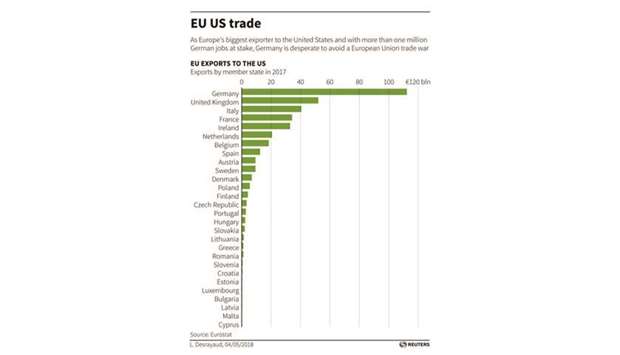Canada and Mexico retaliated with levies on billions of dollars of US goods from orange juice to meat, and the EU was set to tax bourbon whiskey and Harley motorcycles, after Washington risked a global trade war to impose steel and aluminium tariffs.
European Union Trade Commissioner Cecilia Malmstrom announced the bloc would take the United States to the World Trade Organisation to challenge the legality of the new tariffs, saying negotiations with Washington were not currently possible.
EU retaliatory tariffs were being prepared and would take effect from June 20 once backed by member states.
She also announced a case against China at the WTO over the alleged infringement of intellectual property rights, saying the simultaneous action showed that the EU was being evenhanded. “We are determined to protect the multi-lateral system,” she said. “We are expecting everybody to play by the rules.”
President Donald Trump’s tariffs on Washington’s closest allies drew condemnation from Republican lawmakers and the country’s main business lobbying group and sent a chill through financial markets.
The Dow Jones Industrial Average lost 1% and the S&P 500 shed 0.69% on Thursday.
Shares of industrial heavyweights Boeing and Caterpillar both fell.
Trade war fears drove Chinese shares lower yesterday, with the Shanghai Composite Index ending down 0.7%. European shares were lifted by a long-awaited deal to form a government in Italy, but still sharply down for the week.
Tariffs of 25% on steel imports and 10% on aluminium were due to be imposed on the EU, Canada and Mexico from midnight (0400 GMT yesterday).
“We look forward to continued negotiations, both with Canada and Mexico on the one hand, and with the European Commission on the other hand, because there are other issues that we also need to get resolved,” US Commerce Secretary Wilbur Ross said.
Canada and Mexico, embroiled in talks with the United States to modernise the North American Free Trade Agreement (Nafta), responded swiftly.
Canada, the largest supplier of steel to the United States, will impose tariffs covering C$16.6bn ($12.8bn) on US imports, including whiskey, orange juice, steel, aluminium and other products.
“The American administration has made a decision today that we deplore, and obviously is going to lead to retaliatory measures, as it must,” Prime Minister Justin Trudeau said.
Mexico announced what it described as “equivalent” measures on a wide range of US farm and industrial products, including pork legs, apples, grapes, cheese, steel and other goods.
The S&P 500’s packaged foods and meats industry sub-index fell 2%, with shares of meat producer Tyson Foods Inc falling 3.9%. For the EU, a decision on how far to push back will require agreement among the 28 member states that make up the world’s biggest trade bloc.
Germany, by far the biggest exporter to the United States, is keen to avoid a wider trade war, especially as the Trump administration has floated the prospect of tariffs on cars.
Other countries such as France favour more forceful retaliation against what they see as American bullying.
The EU’s plans for retaliatory tariffs would hit Harley Davidson motorcycles and bourbon, measures affecting the political bases of US Republican legislators.
Shares of Harley-Davidson Inc fell 2.2% and Brown-Forman Corp, maker of Early Times and other bourbon brands, lost 2.1% on Thursday.
EU members have so far given broad support to a European Commission plan to set duties on €2.8bn ($3.4bn) of US exports if Washington ends tariff exemptions. EU exports subject to US duties are worth €6.4bn ($7.5bn).
“We want open markets, free markets but we have to convince the US administration,” German Economy Minister Peter Altmaier said. “We tried to do it through negotiation and we will now do it by standing together and formulating a common European answer, possibly working more closely with Mexico and Canada.”
While the US administration’s decision to hit its European and North American allies with the metals tariffs was not aimed directly at China, it also sets the background for separate negotiations with Beijing, where Ross was headed for talks.
The Trump administration wants China to buy more American goods to lower a trade deficit.
Opponents of the tariffs on European and North American metals say it is hurting allies when it needs them most to help put pressure on Beijing.

US ALLIES
